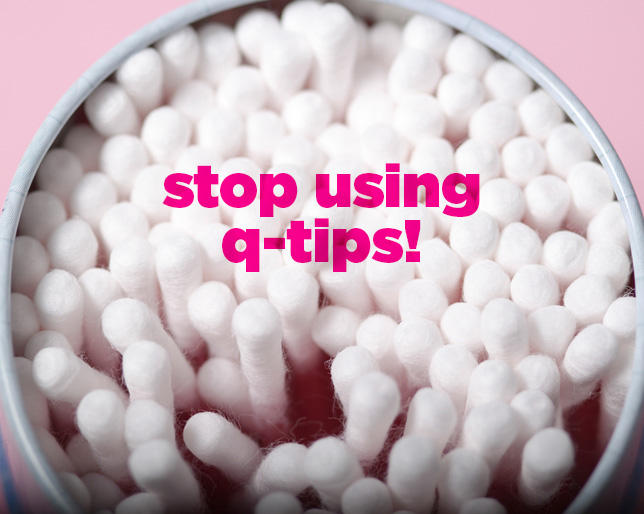Earwax is one of those bodily fluids that’s usually out of sight and out of mind—that is, until you put a Q-tip into those ears and, well, you know. It’s not pretty. But if you’re self-conscious about the gunk in there, the last thing you should be doing is popping cotton in them, says Ana Kim, M.D., the director of otologic research at New York eye and ear infirmary of Mount Sinai. Here, all the dirty details on earwax—and the right way to get rid of it.
Why Q-Tips are the Enemy
Here’s the deal: Earwax is a combination of cerumen, which is produced by your body’s sebaceous glands to keep the skin in your ear moist, and dead skin cells, which your ear canal sheds just like the skin on the rest of your body, says Kim. And though it might not seem like it, your ears are designed to clean themselves by pushing the earwax out of the canal on its own, says Maria Suurna, M.D., an assistant professor of otolaryngology at Weill Cornell Medical College.
So when you jam a Q-tip into your ear canal, that disrupts your skin’s natural shedding process—and can actually cause your ears to make more wax. Plus, over time, you could push the wax back in your ear canal and create big ol’ blockage that needs to be removed by your doctor, says Kim. Ick.
With that in mind, it’s important to also nix any other DIY earwax-removal methods you might have come up with. Suurna says that she has had patients who reported using bobby pins and other makeshift ear cleaners to get the wax out. Beside interrupting your ears’ natural skin-shedding process and potentially clogging up your ears over time, poking around in there with sharp objects could result in a punctured eardrum.

Other ear-cleaning options you should eliminate include ear candling and rinsing with a syringe and water. Kim says that ear candling—which involves putting a hollowed-out candle into your ear, lighting it, and hoping that the suction caused by the heat takes out the earwax—is likely to cause more harm than good. “The heat could potentially burn your ear drum, and it’s possible that the candle wax could get stuck in your ear and cause even more of a problem,” she says. Trying to flush out your ears with water sounds safe in theory, but Suurna says that the water could get stuck behind the wax or cause the wax to swell due to the moisture.
Your New Earwax Removal Go-Tos
With all of that out of the way, it’s good to know that there is actually something you can do to help clear out built up earwax. Kim says to put a drop or two of hydrogen peroxide in your ear about 10 minutes before jumping in the shower. The peroxide will liquefy the goo and help it rinse out as you go through your normal shower routine, says Kim. Doing this once a month should help keep things open. Sometimes, having dry skin in your ear canals can cause extra wax buildup, says Kim. If you think this could be the case, put a drop of mineral oil in your ears daily to help moisturize them, says Kim. “It’s like putting lotion on your skin,” she says.
However, if you have had a hole in your eardrum or have had any ear surgeries in the past, then skip these options, says Kim. Getting hydrogen peroxide or mineral oil in your inner ear (on the other side of your eardrum) could cause an infection or dizziness. Instead, just use a washcloth to clean your outer ear canal (or the part of your ear you can see).
When You Should See a Doc Instead
If you’re one of the people who just naturally produces a lot of wax, you can visit an ear nose and throat doctor every six months to a year and have him or her remove it for you using special tools.












